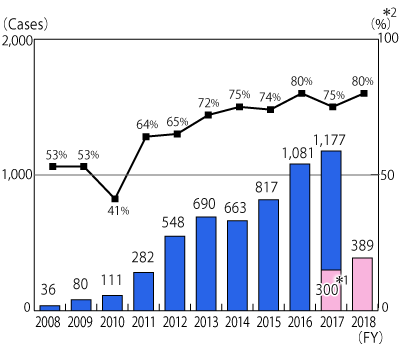Trouble after taken in by sales talk "Why not repair your house using insurance money ?" - rise in inquiries from elderly consumers -
Local consumer affairs centers and similar organizations across Japan have received numerous inquiries and complaints about residential repair service. Some repair service providers encouraged consumers to use property insurance such as fire insurance to repair their houses, saying like "You can repair your house without any cost using insurance money.", "Why not repair your house? We will help you get insurance money."
Although NCAC alerted consumers to similar problems1 in 2012, inquiries about residential repair service registered to PIO-NET2 kept increasing. The number of inquiries in FY2017 was 30 times larger than that of FY2008. Contract signatories related to these troubles were mostly elderly consumers aged 60 or more.
In order to prevent the occurrence and spread of similar problems related to residential repair service, NCAC decided to issue an alert to consumers introducing recent cases and to provide information to relevant organizations.
Diagram: Annual number of inquiries about residential repair businesses encouraging use of insurance.

- *1 The pink area of the bar shows 300 inquiries received from April 1, 2017 through July 31, 2017, for comparison with the same period in FY2018.
- *2 The line graph shows the ratio of over-60 contract signatories. (Unknown cases were not included.)
In FY2008, the number of inquiries was 36 and the ratio of over-60 contract signatories was 53%. In FY2009, the number of inquiries was 80 and the ratio of over-60 contract signatories was 53%. In FY2010, the number of inquiries was 111 and the ratio of over-60 contract signatories was 41%. In FY2011, the number of inquiries was 282 and the ratio of over-60 contract signatories was 64%. In FY2012, the number of inquiries was 548 and the ratio of over-60 contract signatories was 65%. In FY2013, the number of inquiries was 690 and the ratio of over-60 contract signatories was 72%. In FY2014, the number of inquiries was 663 and the ratio of over-60 contract signatories was 75%. In FY2015, the number of inquiries was 817 and the ratio of over-60 contract signatories was 74%. In FY2016, the number of inquiries was 1,081 and the ratio of over-60 contract signatories was 80%. In FY2017, the number of inquiries was 1,177 and the ratio of over-60 contract signatories was 75%. In FY2018, the number of inquiries was 389 through July 31, 2018 (the number in the same period of previous year was 300) and the ratio of over-60 contract signatories was 80%.
- 1 "Rise in inquiries about residential repair businesses encouraging use of insurance money" released on December 6, 2012 (written in Japanese)
- 2 PIO-NET is a database that collects information on inquiries concerning consumer affairs by linking NCAC with local consumer affairs centers and similar organizations across Japan via an online network. The above graph shows data registered through July 31, 2018, excluding inquiries referred from local consumer affairs centers to NCAC.
Sampling of inquiries and complaints
- [Case1]
- There was no explanation about a handling fee when placing an order.
- [Case2]
- When I exercised the cooling-off right, the contractor told me to pay a handling fee.
- [Case3]
- When I told that the insurance money was too small to cover a repair charge and I could not order the repair work soon, I was charged a penalty.
- [Case4]
- Although I received insurance money, the contractor has not started the repair work yet.
- [Case5]
- A repair company encouraged me to file a false insurance claim.
- [Case6]
- Although there's no need to repair my house, a repair company told as if there are some defects.
Problems highlighted from sampling of inquiries and complaints
- Some repair companies stressed that it was possible to repair the house without any cost and did not sufficiently explain contract details such as a handling fee and a penalty.
- Sometimes the actual repair work was different from what was written on the estimate or the work was sloppy.
- Sometimes false insurance claims were filed.
- Some fraudulent companies intentionally damaged the roof or deterred consumers from exercising the cooling-off right.
Advice for consumers
- Do not sign a contract on the spot even if you are told "You can repair your house without any cost using insurance money."
- Confirm details of your insurance policy and necessary documents for filing an insurance claim. Then, inquire your insurance company.
- Never file a false insurance claim.
- If you feel uneasy or get in trouble, consult your local consumer affairs center soon.
